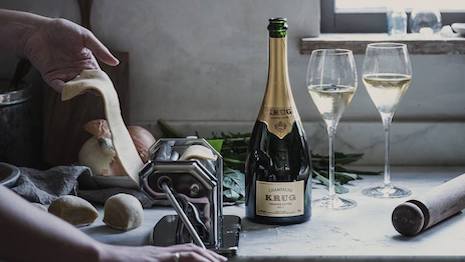LVMH's wine and spirits branch Moët Hennessy took a major step forward in its fight against counterfeiting and protecting consumers with its recent court case win.
The High Court of the Hong Kong Special Administrative Region ruled in favor of the luxury goods conglomerate for a counterfeit case in regards to its Champagne brand Krug. In wake of the ruling, auction house Acker Merrall & Condit has been ordered to readjust its authentication process.
"At bottom, this is somewhat of a standard counterfeiting case," said Steven R. Gursky, partner at Olshan Frome Wolosky LLP. "The notable aspect of it, besides the well-known identity of the litigants, is the fact that the defendant is an auction house."
Trademark lawsuit
In September of 2012, a bottle of Champagne was put up for sale by Acker Merrall & Condit in Hong Kong as a bottle of Krug Collection 1947. Moët Hennessy brought the case before the High Court, as the bottle was deemed counterfeit.
The case against the auction house was for trademark infringement and passing off the bottle as authentic. Hong Kong's High Court ruled in favor of Moët Hennessy and as a result, Acker Merrall & Condit will need to take greater steps in authenticating high-end products to make sure they were actually manufactured by Moët Hennessy.
Acker Merrall & Condit is also now prevented from dealing with any products that bear the Moët Hennessy and Krug name that are not produced by the company.
Moët Hennessy is known for its strong stance on counterfeiting and claims to look to protect consumers. This case is one of many steps the luxury goods conglomerate has taken to fight against this issue.
The company often works law enforcement at a global and local level to help accomplish its anti-counterfeiting goals.
Counterfeiting in luxury
Counterfeiting and trademark issues have continually plagued the luxury goods sector.
For instance, French fashion house Louis Vuitton, also part of the LVMH family, successfully blocked a number of Amazon sellers it alleges were selling counterfeit goods bearing its trademarks.
As part of a lawsuit against the sellers, Louis Vuitton requested a preliminary injunction against the stores on the marketplace. According to WWD, a federal judge has granted this request, putting a freeze on about 30 sellers’ businesses (see more).
Also, Italian apparel and accessories house Gucci has accused fast-fashion retailer Forever 21 of copying its stripes and motifs in its clothing design.
According to Fashionista, Gucci has filed a number of cease-and-desist letters, some of which were submitted as early as December 2016. Forever 21 is no stranger to being accused of designing low-priced versions of popular designer wares, but Gucci has recently found itself under similar accusations (see more).
"Often, auction houses are treated with some deference in counterfeit matters and they are able to disclaim away their liability," Mr. Gursky said. "Here, the Hong Kong court laid the burden for verifying the authenticity of the Champagne squarely on the auction house.
"In fact, as reported, the decision requires the auction house to conduct authentication procedures in the future to avoid future counterfeiting," he said. "Therefore, the decision is mildly noteworthy as to the other spirit brands, but is more noteworthy for the auction houses who are forewarned to be more vigilant."
{"ct":"jxZfCwn6AuVmvqMEaeQcyBPChrFhfLSVBACE0rDxNPu\/b8gfoi3i2KpBc5Tvyeo8hvAjbQGaljwbbDl0smpWOAPELv12RrJBYDG6mlwfVgNK1ZUR26C8mQbsojcftr\/T1xO2YHrCseBzRJlaRhxRCbXyaiPrizGfjaOIcWHwCfn+2sMMO09ORiI\/j9EFzJWF6VygQUE90wyeJm\/Zuzt47zGRdv\/\/n55gS+9b7jSaGIClTpaJziCsAQwWdGL2aDJy3E93ALtJdnYZrMaDYnuzqtMwoE8nvdNLuJdCgbKm3vPBckK7XzV3Rha7Y5la1dwtxAb7Tx+5cD8c1hKL82QpeO8jE6eisnDyh8FWcGCd4xLkyJEoRNWPVsiN8fRWeWt1y9INOyo76z8qsFtk\/8dlAa\/KjAs\/olEOC\/lf0KAPdA4NVL563I3hcLH+gOorLXYGWAOC+T6BdSiAeVTbBNC2+Sth\/o2P8xNI5c6S46rw\/8BJjIWtjQhKdza+uPA0K8rAtDjKWtw6pnF\/HlsKEQkqlm\/soaymCkPB\/vtCMxBtXzm+9oQGMF7i88WaM03qktu1uSFRonVyzqJePiC2IgdPiF2H2dWkwJxOVRaNMRTropit7bikPaUfmRdnnzE+JhfO\/rnU7iISDC6qQz0OjFb3HiAqvimVyDEQPqjl00yaYyInrrN7F9g92eVaRRcwSxgQAgB1kXlUMVfs67PRtRDfq0QYBx73v7SaUEBJP4DkD4dYfYc6LZyHBQi4GajJQ9pJd09Opr62etK\/8+KW5tEOivrMtKQuEiRKv8bszZ62Evd2ChTgMp7rnsCA4iSH2KyJYjwapbC6LiQmLd4+fcOggAUeQBUYZ65ikCLiL5tcshgUfzc1iHnraEqMGd1eWJ\/Dxe\/c+Ers+D5YdUn17hzbn1kSev+T8wyWIdmMwgnavo1lPp+C2b0SxjNre2c\/rm4OKabcnj85oEHaQhsJmUPbS+iVFoNw4F37VZqjxmjIQWFzNTmwhiSydlNtmSD6zE3Uny0h9xgo7j\/VKem7TLUQVCf9svDIhIJE+S3TK5tdS3lAyufaoIlJAOd0Cxew245qzMw0SShCTqQyNSAFdz4zuGjnOp8NleDRMiaQnlZfHRueCsMNaYXI3nU+\/5HShRSGMrqz1fGOUiAuVlv5GIvLykhf8r8zi7bC6KrbikJyQLK+6+xJ3BP+TwDvoU1tm011gfXUmHpxj0ojsnu9I7Jva4qnfGEUgG9MapdST43UqgDHC40jXHRVS75GY2w2ArAPXDRPIrLeFmM\/IT4kA+rIoZ7zvvZp7dc\/3ocoTdwFLGw8EVHoyLQz5d2FM2KNXehtWtV+iYgB86i5PyR5yOnIWOboxKQfkFqSF8in2b7YGGoJs+1oBoaWd0Y82KWE5DQAZl5C0jsKdwhcB7uN5HY0HMg+k4tKSNmfOIKBCKSjmixyfAFkZvAyLhAhKOl5m1CH3G2\/Fix5vZ1f3kcw7BoAG4MK29kHQXZr8C7\/4ljUQgGyZo+1Z4gkbPYowT6d3XdSFFGrhiL31d9tsFA9Uk6XGn5X1jbDFNeDXjhBA1JhScgfav815aTRzvFvqL24HOqW0Xofb4YDKWA0EpOFCca7cCgUXw+z3cTwWX0iuvfO8ScBrI+bHrTa2qkZ9wqK8IoSnPZlnOdmwRjWBzgI6qbZSuKS+ddELK9rWxl9uWia6Nb\/HArj1HobjqvL\/6f8+kBR0sfbKDLveacb5iK2Bt8RFKJGTAj+Id1Brdz3P5cSFbgA0YqRPCcTPyQtH2rCkmsRCacrDAfouBWbXZONbvvdlRHt1GashRdogjCPW0hTLXUSECXqz3rnQnUvEwHqj6J0yj6rgrAJI\/KVbqmghCXt24Eb2cvIR07xORPpomzQU0A0oWSvQxV+eyYx+ElmPaxtAoeSjFAK\/xpy0N8ogbmOm0Cbjh9MaEXAgeNOM7l6ktWKJ5uhkzHGsA7Bm1otg9zdVsvPhTLKao3n0RUN3qsQncOTD27JT1fYtDOgAj4BDuh\/sEYwEdDyYjiKIEAbjb3CTum\/rAfi+w\/+vHJsP1VkqkugB8xhFDFFTTdUuCc\/8kYjYEqiATxWcGDQk4ML0qes11SXRNBkh3pxSAComXS61PJBKtrD03euqHR+\/np7gqdv94sO20WqdBP8hzwjzhk+MCsU6oe\/W9hKS\/V0c7KRFshejpBcHnTmWW2gbeA1aVmeB2abu4DXP1FiD52PQMnEqX3FmkerzElU1odDCzhUa2gzbXfroTAVH34kniXo40ntnrONL1ytBGBg14MRzLE38qWAt+E5yg3GjWmJad4WmZ4biiwXE8oQNbDvBniP7NdFVT+tofmx2SFw48bJjjvdqK7mR4VX9KfGPnjGE3NHBjZCr6+ODVml1j2+PYrnffF3oUHkt9D35xyOi2Njyje2ZnQMPGY7oSb4J\/OZUmTqiYJzqFVYcnnbhpqx0+Dgiihq8+BPzfa0BINzeXHU\/rB+ETg0qYv+pl2Lw\/vVbT1eCstQxalj17RJKCKDge9PiP\/drklf5KQnBqWM2MM6h9FKURr5Jhi0SORGA\/AZO6TCvIiS+ajyIUGXxKsqG9vt0aRgJB+vSFxiftw4qiH5HD69HO+lFfDaG7Z9m9ev1ELO4RYfpMTqXmPsLKtfIqAh9Dl\/uH4je6RTOfIinU\/vXMVWCt6SSQYr396NtXuD1r9lTq9qiCfQxXPpwmpo5XiEHNvR7XyjDX+5\/Jiauc6sN2jiv6XdUbsbGnjoOcKWru98yYDH2TGgyQN5RX0My\/dVxUAdroleVebeIlInJJizxTNV8eMvUesTAuHC+arHIrcmB63R3TNRnCoNgD9eV29kZOu9qOmfayTWvRrvzPOkU9E4XaWjR+pb9SOPIA9naYhHDYIy819GOOI\/7o0IY6Ih4wRxWhG8I0lj9oiXKDvQM25G2dBvgTSYZFGMcdTSambEDd0OTRdnUj+BL0Yril+pSsrYIIjJIkkhL0L5QFoW4g4CVepY7+K947hQWVslJpWcjzQ2GiayfnQhkD+5ds0JCepxzUclbQxivLWqrXIFqpDKmlQR4qV4KPvQo703KTc1+UM9bdCRAs+9JXBQZwT1bkuXez53MZyzqCjT7\/pJLW3xPSGQ3Wu+9jSXbhjsICgykvSWKzLg4QYHRtiaLb7j4WhyZpMslx9R53vR8UAspBatishzkv7aE5CcMhZSW\/Vn8lCHdYO0yLBF76f0MRbED\/KCoUJ8rgRzYqBrzaj8nzX7QW36slDRFxs5tcU\/DJhFxxi\/uav0rvSoEa6QjUCHOiE4Mq8YtAGtVpYbuLVrQm06FqFEfr51pwghw+o30eOB29l81yR77S1jqWjF8+PvFKxiVEXKp\/UBMUqRXjTx9CngcdvRqJluGts90NKwvaEjw0fRQqRj02Scm4zAsSbzEG5cH6ypYbSqSO9y8aWzIHoMoU6khrSKUnk5fSbUObaYNbOP1DbKUlhcha9LnfpnTA0wXQdZc8ql6AXOkSvRws8gAIhCJBqgrCUBDsQTyDrCv1i3yGuZTNNRmgZRcigd+JoC0F0MlRbBmc7B6XVAi62qnflorDJQnJG+SeO9v0+CSeX0pgtvCwR8lNT8L\/rXj5Xa4j6CChFB2LIy\/cVyBfcnQOXq6rD6hK+wmqF2kuquOS3vBg3+WIsJgrsiTptFpxCWqXxjjNRHsra9NWRK4kaLPYhhoUQf6O9Zr8H0FH\/YNYP5Dk9xSYUTroDFeVnHo1+cbdNkV37diixWgzjuKI5ZurnaiH+QbkC+GZA2610boFyXjVnHIYFlECBLOGeK3YfnqN7Vtzx44WSHCQeZdccevizi981mEHWmJh7RCtdvuYbxj51vz0wYw6A7AOIVJJTKpyYUU2niBXMjZd62N+b0JD8B8a06rxfbhZr7\/+qlQFERhNoOQUpTOwoae9mOod1\/s6rhWouo46rHf8dZGTPYbSNlaxj6jDBusVSGdrgsSektC1ouVhTs2vBzRRu+zAYNeCKxavk8mo4vbC4SGYSpXaynFUIboxfoM0P\/cEBxYgaE+Z8N9pcrWUEwDH5Z8nDQG9PqhfaNb1xwPvSaw0rzNXDyoOc0MATUdA9kE2XbHMGZmYcW+K7osV\/g8H3iHzD7WW3wY5gNOwBdCD+fMalpIZVwW+pj2HJO65MyfQwmvoX6OIoyRReiU45t8GPuWRjT4uDZGv8i9LpeBx6psVnIlAhzmIEKau3Levai4xrJjQtFl4PMynLn48CpgkWr8jno+SNpiku8hCji2m2DWqb5yL92\/KpMKli21N8ZxAuSNqpD7hwK59aWCGsveyyAuvqbLoJ\/c7hTG\/p0zKCWcml94mzZPn7YmHWlX5Z+TBoxkPwwp3eB4dyd9mfwpxyGHDWWoVLj4IlWavj5XGtqHnicA9d\/61zjXe7nRgedLibAIFFpL2jDXy\/9dWOjBASQbERBjQZ0q1fe6vnT58TUQvnRgAoJVxwoDv6gfRavO5cnj7DwlKz4OeagatymsidIvwuZm7\/mvCbvD9DFlB9JxlxhIvjA4Ichoidw5gB9Ret8zv8aq\/Hxa2L1P4gPDHbJ4ihxYZUVrcnPZPidUzUlo7pUJB7LuYtE\/CEjmY8\/jB0ct578bFAq5b3vy8S8M8o+HVwR+oaTGtPju82Z8FlSrseC+7ZnPQxGx2IfhRRlaihS7T8XNjMU1GLWSSUKeFxr1E5yrjb6lEp9A2L6gkndMlpqB+VpKzT7TiOikPmy1Ff9O8NmWwr8KEDGrBIBvPU00zfhM0slbuk4t5Kbv6+dqs\/RSVtfagbk\/FyL8McB3I\/7DKvDhQe3gsbgtZ4Q11rcKTazYE3828z6OxwKPckZ91IrnrmG60iENdy6MiIoF84bUvRJpAaLkl90K1hIWFDE472g4z41Exze75jsdRjb7ZB+CoownN0\/iuPcudyvhSkMO5aOOd9pZrYyt6kpawvkNzJBn5hx+h2BOfgs0sbN0RbtjdULmHiPGYk7METsK4hMGzdIKSELHdNVde8rXavj7UpJHOkrLrrA2H6TDB1nuvb\/lwUhSwf3UKzHsf7SyHH1gGUJQchd5MtprMqXAPQPJERMtfr9Dxg8HWWUgdUSHnCgzInvu3LHzDeItJTZK0OFks\/9LvojWwUMyTaW9169gkgJa3fiioni3UKpc2vbBqwHXGPxP\/pQGBlusQSsqhN0v4\/KI3389OusqDd6Nm+x66PApZFWD5gOik\/EQ4+pY\/EU\/8VLHoSG+JoC4SaAf\/eOMyscAsdAkMSdlUiIuHQsMfRuosNtB3hvSmjKfZ7LiZeNTy9fpH12Ea4uyM550WArwbquzRpGcVeNePLxNjaALPt\/rsRg9WOPubwzzUfHHmP\/H8EJZNTSnqEXs1Z\/OH6f+y6kOtSY0201676co2pYZoUvY64iKScr3fz9Yasbb8legzx6tzxeHLxJCAfbybw4l7a7P++RV3qWFgPjPJsluVFeZi2Mz+l4Kk1tlgcc3HJoCGXMtqscdjAmOmih+WT159MZIuU4kazw9CF4qgBjlO+euIO7tFnzAi1BGNhFHBNWANlhlCi7GtKCkTjkdKBIhlsao8k2Q4JGeHOHzDs91pQPPm\/9\/AKx20MgfmercgE8\/SgcXEJmlOK\/BRUuXTeK8lkR2p+TGIFb3qCLsehde97vkDa+0TY0C\/Y2kBLLR4Wt41++lm90382Gzc6t9KH6iXsoi4rwDcw8mCY45tTPezkKfFKcetYPm2AOM38NQhwlCpjyUiLfb4WDLJmXpf6JhPZMjzg8O5RiH8jdVWRdOfFd+npjd+047Zqh6qzlXsfGc\/9yZO1efcHR2TQCzF1nl22KTvpVB9GWX9wCtRkxbzpqnxFcfM1G1mWtpvkuoDHy7wvpp+C0LTkzmxUjt\/nYH99UoUB1WEmXoMW8fnVtZrdpuG+TfsIAWMLrHK4pHesKeUPtwA8RT07Muxx4+7UXQBRxtku8cNQeR1XyO58PjeKrQ65tWfcCaO9M3Mz9S3ZISz0UqrSAU5YSExNVcr9Th9C9R+MDA2BaM8YzDsufDYhk5vUwHc9gfnZ66lJbz9xHnvxtzYDI3GoeJJ4\/j1CI6Isrz24rRUuj9mpFhagy0VbGsoMY1PnHpPjvbvs2Ia5sMpz2n1hl+ZNUSFIsjqTnIpK\/o8DQVeo0n7to+SkAfa8gix0gfLHL1F93vNnO+H2lQCugW42o5puvY3xYXJv0JCs5X0RsGAvmMJfxXzQVnIh1sK4zoG\/kGS4IaY+vZWsgW5U4QrD++XcLPVPhZw\/t0cirYbwkS884K0rgRpVY\/8TgLZygEem1kKgpst+VN4U7qzctu2nZfCyHoEAaFJDjfeUynddkIBfi1yQjjpsy3lYZgEe7nqJadldnH6TFPvgqTWJ4vjOZknY5DJ5SbRcNdgs+sjcWjTwwxeH2NUyk4E8HBjvXAmGVLnPJjsRi4tB2yvCqiCPBSouccJnTSszixjWJcbxuTRI9xAy6VTkj6U9oYrM8\/7\/Ti6QoTMZt0KTTu4wxVOHrmJnenZtRm7tBFMj3gpjpe1vYAaiAR+HTYUNOGJPwYUSrUhw6GGkNOBzDxJuCfnzKqnxLsGfd6JyCWfdh+clAvq96HNsWaWC\/1Af\/b+\/n5dewkAvsv+CgIKseJoHdC3JhyJSPff9QgVwTXT64PTmZ9lPZwyLHVltQMiX8utnUZakfmm+vmK1fGlluNXZtHmpsu+fl4SeqQArgRorb4fAmr8rOeL9xS3VTIZqSEaVqwhM6BDuuLWMDMxKQ546f9rBKxRfywpUWDFtaJsmYpdZkLK74hiI5iBaYo6ucBNbFT5bUCuSIk2wawvuobqLuyG6X0sB2Q2X69sdkaMdgKUboL7jvUoXHIAH0zmgQhg8+SqLlT27rA8wqaKh+XNQP7oiaRwlr3Qsvgks1xQrqVISvJvawu1WVr4TkNAVokc1jFt+Zgf9vdJQT5Z6TA3oOSDu\/x2FgyZCMU9knV5T2WwokoRsvOV0w9Vrrm0eRyR9oZjAn4nDsW++BkXVz07ZXR1qx+WYktw2z9eY\/YmN5BbVCiz505f5gx1Zx1LHEsb40UpDhIpKOtplHRRr1BJM0IG2a16\/xrewvfZVfgqUS29a0qvxtb1+gCCIh+dNvaxBM64FmdG2ADmbimy1dLFQ2C5WvdjEtCHYDl\/otcZ4hS8RfgL\/4qankzlfvP5tTLgr\/Ili0S3T\/bhoFa5EV+QWiCRfRTL3fVzhu6tb5LiznTF6HbKIO6JiaEEcTUI60bgkdlaiIy\/V0Whhho62Xa7DpUkJCJ0oPMALYkfVlPFqJx7wkG0IcPzRSXOH1mlhstyfxeJSxUFIEQ2Cigkkxhl3tMicvREpGCSbAN\/R6hbm2ymP\/I7j62W24A1MN0ScM9u0w43TpIkdl5V3gHsWb8HObODJPkkxpqRXU3L5jDCVPF2w24aHXDIADM6TYXSXqpjlw85xs+nQLNxPbsYg3savDxEuUQvfVRq+5jdAEffIggDRf5dQulfVszePujb\/4sFQfGxQTuq+5E3dadKh43MjuWMGDwEaFNhbaaN\/TeK160I2\/r1XkRS4lSUAXav\/SZ05AOK16FYwUMVBfYdU\/N\/xMkKLpXX3g17dIamMrV5MG6LZNw+JuHuCGNPVvPLyggouB\/xP7K7LXKUZP9kQ336lBT8GBUdwLlWHqXvVtTFxiCnj7+xkYFNG3qdSsBxErsvZiXNt8d2SJRnVXF7+qBNSZqHXqTg+Mbcv4rki7ktytwzWr9ptau8VasGbUO+UuyJXs8ZUPs6ah1ehjvUwsNGTilXQ44HxAr7nZLc+OVzzCxSiTxblV6R6kj0rPGHap66isDil3rM7Q1dlPR1tIUMZA46a0RAnldztJGzKTBm5EscZe0KpG7hatOYC09\/p7yXQQlJ8mop8X4N60xEs6TR9bejeC9jjLE3pM8QneBQ==","iv":"509c6d8a2fa6c911a997bb58a5538af4","s":"1487526c102cf348"}

 LVMH-owned Krug Champagne fights against trademark infringement. Image credit: Krug
LVMH-owned Krug Champagne fights against trademark infringement. Image credit: Krug